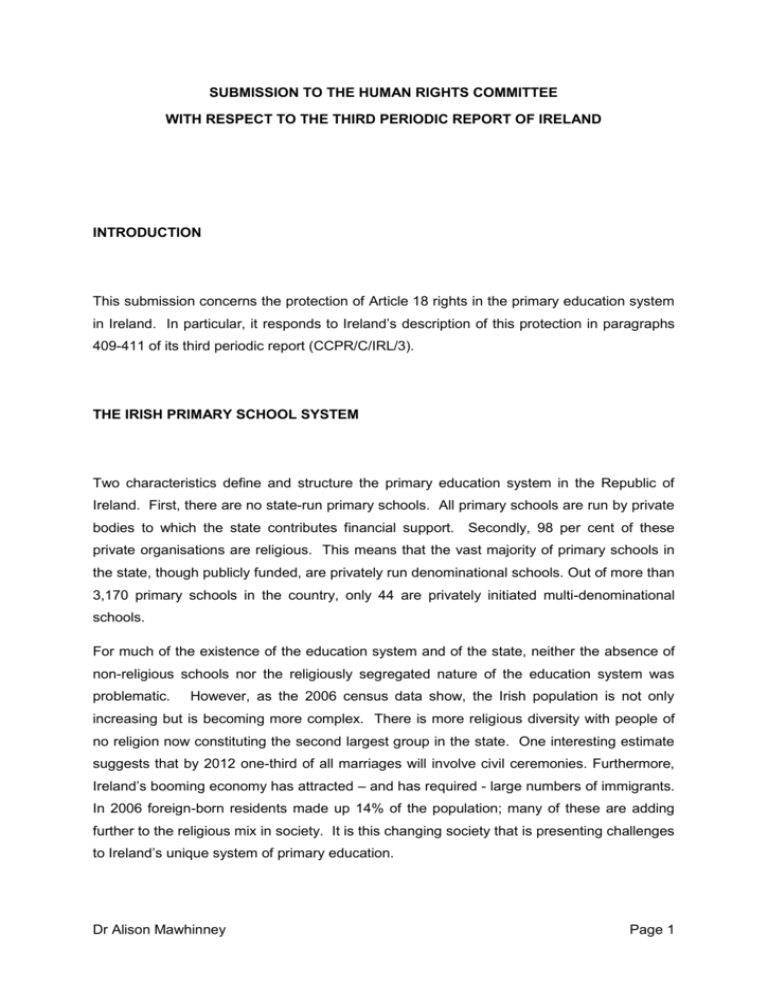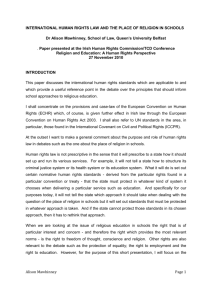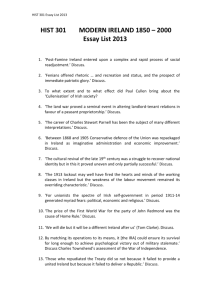Queen`s University Belfast
advertisement

SUBMISSION TO THE HUMAN RIGHTS COMMITTEE WITH RESPECT TO THE THIRD PERIODIC REPORT OF IRELAND INTRODUCTION This submission concerns the protection of Article 18 rights in the primary education system in Ireland. In particular, it responds to Ireland’s description of this protection in paragraphs 409-411 of its third periodic report (CCPR/C/IRL/3). THE IRISH PRIMARY SCHOOL SYSTEM Two characteristics define and structure the primary education system in the Republic of Ireland. First, there are no state-run primary schools. All primary schools are run by private bodies to which the state contributes financial support. Secondly, 98 per cent of these private organisations are religious. This means that the vast majority of primary schools in the state, though publicly funded, are privately run denominational schools. Out of more than 3,170 primary schools in the country, only 44 are privately initiated multi-denominational schools. For much of the existence of the education system and of the state, neither the absence of non-religious schools nor the religiously segregated nature of the education system was problematic. However, as the 2006 census data show, the Irish population is not only increasing but is becoming more complex. There is more religious diversity with people of no religion now constituting the second largest group in the state. One interesting estimate suggests that by 2012 one-third of all marriages will involve civil ceremonies. Furthermore, Ireland’s booming economy has attracted – and has required - large numbers of immigrants. In 2006 foreign-born residents made up 14% of the population; many of these are adding further to the religious mix in society. It is this changing society that is presenting challenges to Ireland’s unique system of primary education. Dr Alison Mawhinney Page 1 The problems manifest themselves in two distinct ways. First, in areas of high population growth there is a shortage of schools. Catholic schools in these areas operate admissions policies based on the religion of the families and this has resulted in non-Catholic children being turned away and left without any school place. It has also led some parents to get their children baptised specifically to ensure they can gain entry to a school, any school. The second problem is more widespread and arises outside major urban areas. Here the problem is a lack of choice. Very often parents who may not wish to have their children educated in a religious environment or who may want a more multi-denominational approach to their children’s education, have no choice but to send their child to the local Catholic or Protestant school. Doctrinal religion is taught in these schools through timetabled religious education classes and through what’s known as the integrated curriculum where – by law religious teaching must be incorporated into secular subjects and throughout the daily life of the school. In Catholic schools doctrinal religious education is also taught through preparation for the sacraments of First Communion and Confirmation during school time. In this situation the question is not one of discriminatory admission policies. They do not exist here. Rather the issue is the protection of the religious liberty of families who do not belong to the religions that run the primary schools but whose children are forced to attend these schools. THE ISSUES I would encourage the Committee to raise the following three issues with the State. All the issues ultimately relate to the lack of choice of school types in Ireland where 98% of schools are run by religious bodies. 1. The integrated curriculum By law, schools can and must teach an ‘integrated curriculum’ whereby religion is integrated with other subjects and throughout the school day (e.g., prayers at start and end of day, religious assemblies, religious services in churches during school time, altars in classrooms, preparation for religious sacraments at ages 7 and 11, etc). For a detailed discussion of the integrated curriculum, see the attached article ‘Freedom of religion in the Irish primary school Dr Alison Mawhinney Page 2 system: a failure to protect human rights’ Legal Studies, Vol.27, No.3, September 2009, pp. 379-403. The practice of a religious integrated curriculum in 98% of Irish primary schools endangers the freedom of religion of a child who does not want to be exposed to such doctrinal teaching. In paragraph 411 of its report, the State suggest that a student can be exempted from any subject which is contrary to the conscience of the parent or student. However, when an integrated curriculum is taught opt-out provisions are not a potential remedy. A child cannot be opted out of unscheduled and potentially continuous religious teaching which is woven into the very fabric of daily education. How can the State guarantee freedom of religion in this context? 2. The operation of the opt-out clause Reliance on an opt-out clause to protect religious liberty in Irish primary schools is fundamentally flawed. In an environment where the student body is often strongly monoreligious and the pressure to conform may be great, the right to withdraw is not an option children and parents will willingly choose. For evidence of the inoperability of the opt-out provision in Irish schools, see the attached article, ‘The opt-out clause: imperfect protection for the right to freedom of religion in schools’, Education Law Journal Vol 7, No 2, 2006, pp. 102-115. In paragraph 410 of its report, the State suggests that parents have ‘absolute discretion’ as to where they send their children to school. However, given that 98% of schools are religious schools, parents very often have no choice but to send their children to a religious school where they may reluctantly decide not to opt out their children from religious class and assembly. What immediate steps is the State taking to offer parents a real choice of schools so that they can send their child to a school which is not religious and therefore they will not be confronted with the dilemma of whether to opt their child out of religious class? Dr Alison Mawhinney Page 3 3. Religious discrimination in admissions In paragraph 410 of its report, the State suggests that parents have ‘absolute discretion’ as to where they send their children to school ‘subject only to the rights of others’. In reality, this means subject only to the rights of those who run the primary schools – 98% of whom are religious bodies who are allowed to discriminate on the basis of religion. See, for example, attached media reports for coverage of this issue as it arose at the start of this school year (September 2007). In urban areas, where school places are insufficient, religious discriminatory admission policies may result in either (a) certain children not gaining any school place or (b) parents getting their children baptised specifically to make sure their child gets a school place at all. How can the State justify permitting religious discrimination in a school system which is highly dominated by religious schools? Dr Alison Mawhinney School of Law Queen’s University Belfast March 2008 Dr Alison Mawhinney Page 4







